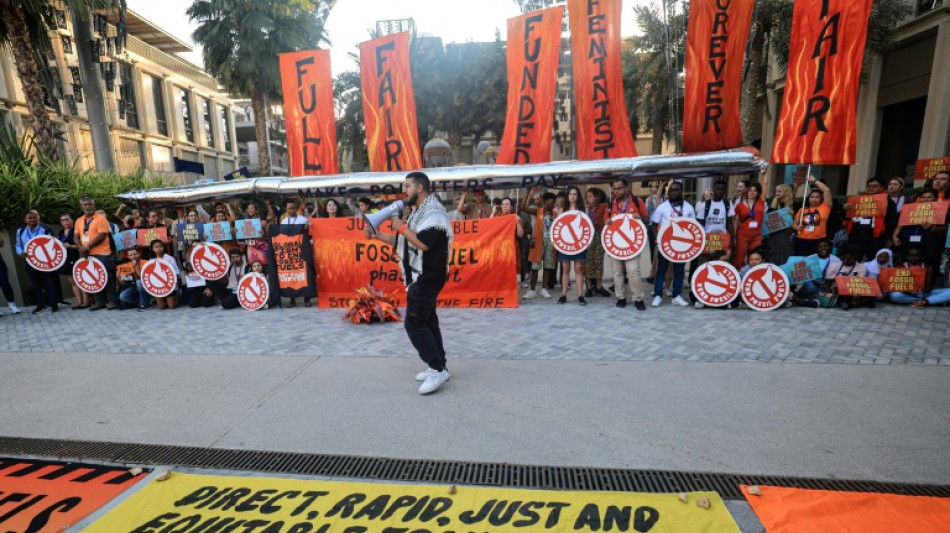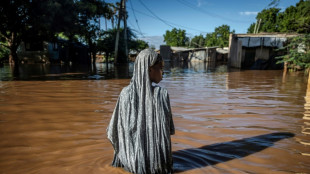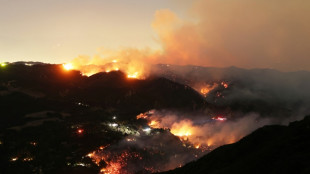

Fight on fossil fuels as Dubai summit goes into overtime
Western powers and nations most threatened by climate change fought Tuesday against oil producer Saudi Arabia for stronger calls on exiting fossil fuels as negotiators worked past a host-set deadline in UN talks in Dubai.
The 13-day COP28 summit in the glitzy metropolis built on petrodollars has debated a historic first-ever global "phase-out" from oil, gas and coal, the main culprits in a planetary crisis of warming.
But a draft put forward on Monday by COP28 president Sultan Al Jaber, himself head of the UAE oil company, fell well short, instead presenting reductions in fossil fuels as one of several options.
With low-lying island nations warning that their very survival is at risk, negotiators worked through the night and the Emirati hosts promised a new draft to try to find consensus.
Denmark's Dan Jorgensen, one of the climate ministers tasked with leading the talks, said that the Dubai summit needed to be clear that fossil fuels were on their way out.
"I'm personally not married to one word," he said. "But I am insisting that the meaning of this formulation, whichever one we will end up having, has to be extremely ambitious."
French Energy Minister Agnes Pannier-Runacher called for the "clearest language possible" but added: "Obviously we can accept edits that note that we're not all coming from the same place."
- China low-key, Saudis opposed -
Veteran US negotiator John Kerry has also urged stronger language on phasing out fossil fuel, even though the United States is the world's top oil producer.
Kerry met ahead of COP28 with his Chinese counterpart and reached an agreement to ramp up renewables, hoping to keep tensions between the two powers -- the world's largest greenhouse gas emitters -- from scuttling global action on climate.
"I wouldn't say China is fighting with us, but we're not fighting China," said one person close to the negotiations who backs phasing out fossil fuels.
But as for the Saudis, "they show forcefully that they are not willing to move," the person said.
Saudi Arabia, built on oil wealth, has told COP28 to take its "concerns" into consideration while the OPEC oil cartel has urged members to resist calls to end their lucrative export.
The most emotionally charged appeals have come from low-lying islands, which fear being submerged as polar ice melts and whose teams flew to Dubai at great expense to their national budgets.
John Silk, the negotiator from the Marshall Islands, which lies on average 2.1 metres (seven feet) above sea level, said Monday that his country "did not come here to sign our death warrant".
Vanessa Nakate, 27, a leading climate activist from Uganda, said the summit had to address fossil fuels.
"If leaders fail to address the root cause of the climate crisis after 28 years of climate conferences, then they aren't only failing us, but they're making us lose trust in the entire COP process," she said.
- Seeking consensus -
The Emirati hosts put a brave face on the outrage, noting that UN rules require consensus from the nearly 200 countries at COP28.
"We need to work on how we put their views into the text in a way that everybody can be happy with," said Majid Al Suwaidi, COP28 director general.
The text, he said, offered "honest, practical, pragmatic conversations about where people's red lines really were".
Seeking to force decisions, the Emiratis had urged a deal before the summit's official close Tuesday morning, but Suwaidi said after the deadline that the priority was to "get the most ambitious outcome possible".
Zambia, speaking on behalf of the African bloc, supported a phase-down but said the continent's oil producers must receive financial support.
Scientists say the planet has already warmed by 1.2 degrees Celsius (2.2 Fahrenheit) from pre-industrial times and that 2023 -- marked by lethal disasters including wildfires across the world -- has likely been the warmest in 100,000 years.
R.Abate--IM




